Buckle up, pens at the ready, tighten those laces and stay alert. The Faster Lane has spent the past week crisscrossing cities, dashing over nations and jumping the Atlantic. We start on the small, secluded terrace at the back of our HQ in Zürich, coffee in hand and opposite a man with a set of plans.
Build it better
My friend Todd is on a mini tour of Europe and is fresh from Copenhagen’s 3 Days of Design fair. We haven’t caught up in a while and there’s much ground to cover – new government in Canada, the joys of licensing your designs and collecting cheques and how Switzerland endures as a sanctuary of civility in a generally bananas world. On our second coffee order Todd explains that he’s about to start building a new house on Vancouver Island and pulls out some plans and a host of references from the late 1950s and 1960s. We scroll through black-and-white layouts and hand-drawn renders that were part of Canada’s post-war masterplan to create more housing in cities coast to coast. With nods to Richard Neutra, Rudolph Schindler and Charlotte Perriand, it was not only a mini masterclass in Canadian modernism but also a hopeful session that could serve as fresh inspiration for a country that needs to figure out a new housing strategy. After a while we got to Todd’s own plan – all low-slung lines, local timber, concrete blocks and forest views. The Carney government needn’t spend big on figuring out new typologies, it need only dig deep in the archives and unearth some exceptional designs that could make for desirable communities from Victoria to Halifax.
Superb San Sebastián
Depending on which index you consult, San Sebastián frequently ranks as Spain’s most liveable city and it only takes a day and an eve to figure out why it works. While the beaches and promenades are surely a plus, the winning ingredient is the city’s scale – a tight grid of six-to-seven storey buildings, galerías, plenty of trees and just the right mix of pedestrianisation and busy thoroughfares. As for real proof that it’s well and truly liveable, stand back and observe the locals. I don’t think I’ve ever seen a city with more mobility-constrained seniors out and about. From daughters walking their fathers to the markets and grannies with canes to dapper gents in wheelchairs and well-coiffed ladies with walkers, Sunday in San Sebastián was a parade of elderly residents enjoying the rhythm of a city with plenty of places to sip a beer in the shade or eat a pintxo or two in a buzzy bar. From what I could determine, this segment of Spain’s silver society still live in the city centre, have all the services that they require at street-level and judging by the general sense of conviviality and groups of women in their eighties chattering away in restaurants well into the evening, the Basque city offers more than a few clues about how we can keep older generations entertained, stimulated and living life to its fullest.
Licence revoked
I am starting a global campaign to close down all hotels that continue to think that it’s acceptable to put a glass box in the corner of a room and call it a bathroom. While San Sebastián got many things right during my three-day stay, the first hotel that I checked into was perhaps the worst example to date of a room not fit for double occupancy. Why? Why? Why would you want to have a barely opaque wall, a swinging door and all-hard surfaces right beside your pillow? Judging by the shiftwork in the breakfast room with one partner munching on their manchego while the other was back upstairs doing their business, no one is interested in this concept and it must stop. If hotels are so proud of this feature then they should celebrate it on their website and not hide the fact that they don’t believe in proper doors and the preservation of privacy. Smart cities should revoke licences or halt planning permission for hotels that don’t offer dignified digs for doing your thing.
Better setup
Should you make your way to San Sebastián, I can highly recommend the Hotel Arbaso in the city centre. This was the refuge I fled to. First, they have excellent bathrooms. Second, Narru restaurant is a treat. Third, top marks for uniforms and sunny, informed staff.
All in the details
Post-San Sebastián I jumped across the border to Biarritz for the film festival and saw Richard Linklater’s Nouvelle Vague on opening night. The film is about the making of Jean-Luc Godard’s Breathless and is a fun romp around Paris. The styling and scenes were all convincing until I spotted a UTA DC-10 in the background. The film was supposed to be set in 1960. The DC-10 didn’t go into proper commercial service until the early 1970s. All that said, it was my first time in Biarritz and I must return for longer than a film premiere.
Meanwhile…
Back in Canada, I’m flying from Ottawa to Toronto on an Air Canada Q400. As this is a short flight and the aircraft doesn’t climb that high, you get a good view of Ontario’s urban sprawl. I’m thinking back to my meeting with Todd and the future building plan and hoping that someone might suggest that for every house that goes up they need to plan at least five mature trees to create a canopy around future communities. It’s depressing to see how much construction has been permitted around Toronto with zero consideration for trees.
Happy Canada Day
As I head back across the Atlantic, Canada is gearing up to celebrate its birthday. I’m keen to see how the country marks the occasion off the back of Trump suspending all trade talks on Friday and Canada embarking on its biggest defence push in decades. Can the nation stay on course by continuing to pull together? Or will it stick with a narrative that looks backward, picks at old wounds and spends too much on celebrating differences rather than focusing on the social capital that comes with a strong national identity?
For more observations and adventures in ‘The Faster Lane’, click here.
When news broke that Tim Raue – Berlin’s culinary enfant-terrible-turned-fine-dining patriarch – was taking over the revolving restaurant atop the city’s iconic Fernsehturm (TV Tower), it sounded like the ultimate redemption arc. The space had been crying out for a rethink. Opened in 1969 as a socialist showpiece, it once dazzled with linen napkins, rotating views and a heady whiff of space-age optimism. But after reunification, the sparkle faded. “Sphere,” as it came to be called, devolved into a turret for tourists and few Berliners bothered to venture up.
Raue promised to restore dignity to the site by reviving local classics such as Königsberger Klopse (meatballs in a cream-and-caper sauce) and solyanka (Russian sour soup), dishes fast disappearing from the city’s culinary vernacular. On paper, the concept had promise. But instead of a cinematic ascent into East German futurism, the updated experience feels more tepid conference luncheon or corporate-retreat buffet. The food, while technically competent (no small feat with just a single service lift to the top), arrives with little joy or theatricality. A starter salad, for instance, appears pale – perhaps stricken with vertigo.
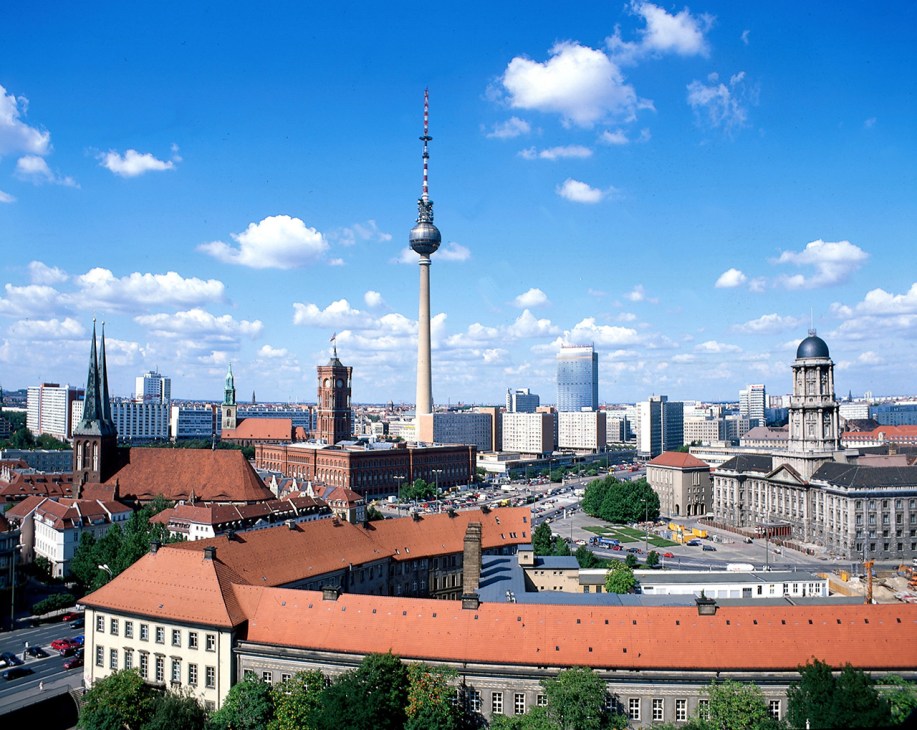
This is somewhat of a cautionary tale. We live in an age of grand revivals, when erstwhile beloved edifices are spruced and spritzed for a promised return to form that harks back to an oft over-imagined heyday. The danger is when it all starts to feel retrospective. Nostalgia, while seductive, is a blunt design tool. Such reboots should feel like a fresh start with careful nods to the past.
For Berlin and a building with such symbolic heft, this revival is a glaring miss for a city that’s crying out for a new, elevated experience. The redesigned interiors claim to strike a careful balance between historical homage – “warm tones, iconic lines, a touch of Pan Am” – and present-day cool: “casual, urban, full of energy.” In practice, the palette has shifted from red to brown – too muted to feel enlivening and too dated to be authentic. The chunky tableware might mimic 1970s charm but its passé finish has a whiff of cafeteria clunk.
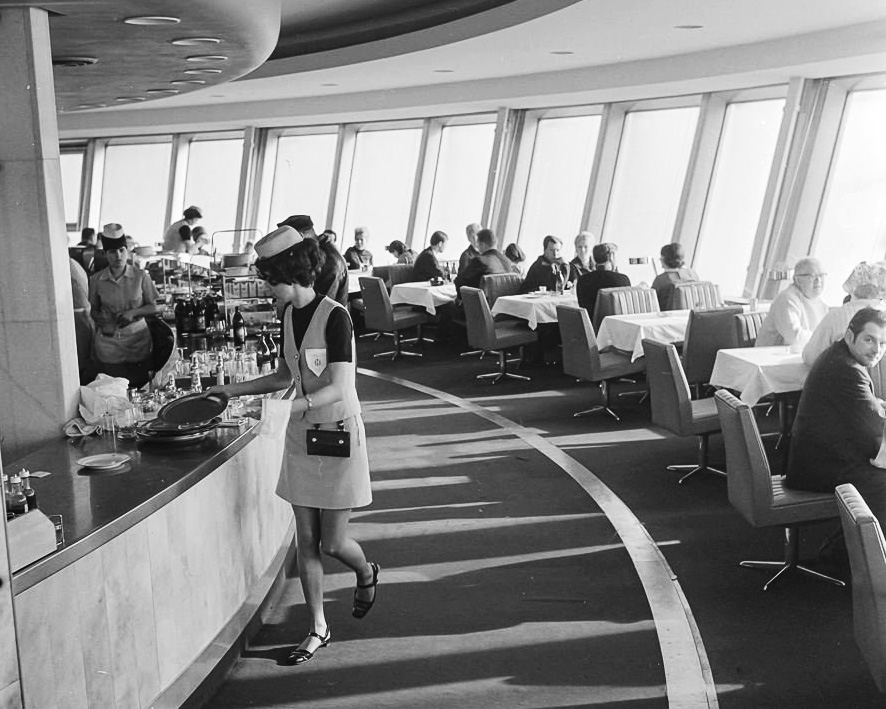
Combined with tightly packed tables, the restaurant feels more cluttered than considered. One design element that does truly work is the original chrome table lamps – a minimalist nod to space-age optimism that thankfully survived the overhaul. And credit where it’s due: the architects artfully reduced reflections in the windows (that always tainted the view) by designing anti-glare louvres into the lighting. But not enough has been done to otherwise improve the space.
Urban landmarks across the globe undergo their own cycles of reinvention – think of the rotating restaurant atop Toronto’s CN Tower or Tokyo’s slowly vanishing bubble-era lounges. The challenge remains the same: how can you modernise without erasing identity? Iconic towers have long doubled as showcases of national ambition. An update isn’t just a culinary refresh, it’s a statement about how a city sees itself. Though Berlin has mastered the art of adaptive reuse – turning power stations into nightclubs and breweries into galleries – it’s odd that the Fernsehturm still feels as though it’s a relic waiting for permission to breathe again.
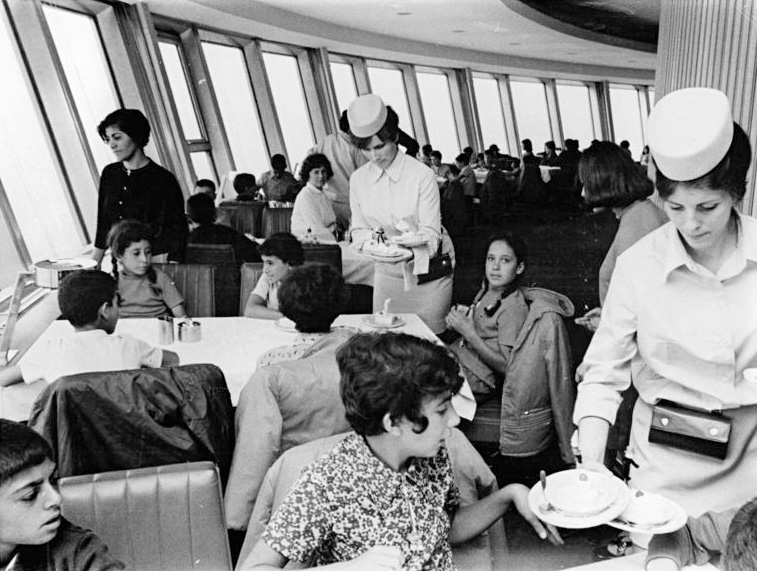
But there is still potential in the bulbous sphere that looms over the capital. Here’s some food for thought on how such revivals should and should not meld past and present.
1. Skip the headline names
Opt for a lesser-known talent with a sensitivity to context. Perhaps Tobias Beck, who revived Berlin’s legendary Clärchens Ballhaus without losing its soul. The Fernsehturm doesn’t need ego – the tower has enough of that itself. Its restaurant should give it atmosphere.
2. Street art belongs on alley walls, not 200 metres above Alexanderplatz
A stencilled Fernsehturm? Too obvious and completely out of place. Let’s remember that this isn’t a burger joint in Kreuzberg.
3. Tablecloths
White linen works wonders. It’s admirable to aim for accessibility and remove entry barriers but stripped-down surfaces shouldn’t feel this bare. As it stands, the tabletops whisper “canteen” more than “cloud-level dining.” A little fabric would go a long way.
4. Sharply dressed staff
Tailored black attire and some crisp monochrome would elevate the room. The current apron-and-T-shirt look feels more high street than capital landmark.
5. Breathing room
Give the tables space for privacy and let the view take centre stage.
6. Fix the acoustics
Introduce discreet sound panels to soften the echo and then lean into a mood that matches the setting. A distinct soundtrack with a hint of East Berlin nostalgia would give the space some sonic character.
7. Bring back the swivel chairs
If you’re going to eat in a revolving restaurant, why not let the seating spin too? No other restaurant could get away with it but here it’s remarkably on-brand.
Siebeck is Monocle’s Frankfurt correspondent.
The Arabian Gulf was wide awake on Monday night as shaky footage of Iranian missiles over Qatari skies filled our screens. While it was one of the politest acts of aggression ever witnessed, the region’s centres of commerce, from Doha to Dubai, are rightly concerned. Iran had launched a carefully telegraphed barrage of missiles at the US military’s Al Udeid Air Base in Qatar – home to some 10,000 American personnel – in retaliation for Washington’s strike on three of its nuclear sites over the weekend. Doha had been given advance notice and residents knew that something was coming when the country’s airspace was closed and the US and UK embassies told all citizens to remain indoors. Then, a spectacle unfolded in the sky: striking and surreal but ultimately bloodless.
The mood in Dubai is a little more introspective today – not tense or fearful so much as eerie. There’s the usual rush into the financial district; bookings for brunches and beach clubs haven’t been cancelled; the school run continues. But people are walking a little more slowly and perhaps even speaking a tad more quietly. Everyone was glued to their phones last night because, this time, it felt different. It was right above us.
In Doha, I’m told that the mood is less serene. Flights are resuming but the city remains on high alert – and it must. The Qatari government is balancing too many delicate relationships – with the US, Hamas and Iran – and now dealing with the prospect of incoming missiles. Qatar has played the middleman better than most countries over the years but the best middlemen know when things are getting too hot.
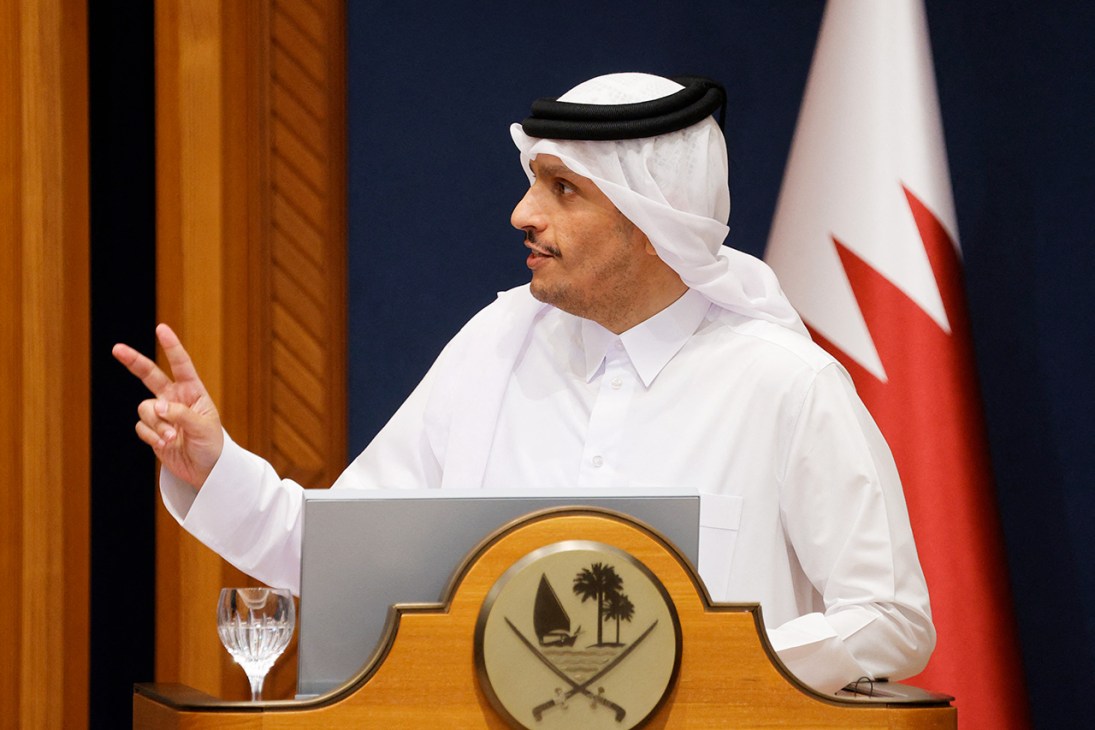
If Iran’s attempt to hit a US base in Qatar looked like the most civilised missile attack in modern memory, that’s because it was. Abbas Araghchi, Iran’s foreign minister, made it clear that the goal of the attack was deterrence, not death. Donald Trump even thanked Iran for the warning, calling the missiles “weak”, and suggested that both parties had essentially done what they needed to do. Israel and the US got to flex their might as Operation Midnight Hammer severely damaged Iran’s nuclear programme. Iran got to save face with a dramatic but largely theatrical response. And Trump got to talk about peace. But what about the region? What about those of us watching from Dubai and Doha, cities that thrive on calm and continuity?
For many in the Gulf, especially the vast expat community that lives between the Middle East and Europe, the real anxiety wasn’t about politics or power plays – it was about planes. British Airways briefly grounded its routes, Flydubai held back for a while and parents started quietly wondering whether summer holidays to the Med would still happen. In truth, most people in Qatari and Emirati cities aren’t concerned about the big diplomatic picture. They’re thinking practically: will tensions affect oil prices? Will airspace closures become the new normal? For all the choreography, there’s still a deep unease. Iran is weakened but also more desperate.
Whether a lasting ceasefire will soon materialise depends on who you ask. Neither Israel nor Iran appeared fully committed to Trump’s script and tit-for-tat missile attacks quickly resumed on Tuesday morning. Can Tehran really regard Trump as a trusted broker of peace when, only days ago, he floated the idea of regime change in Iran? And can Israel be convinced to pull back on its hard-won military advantage when every instinct will push its leaders to double down and deny Tehran any chance of rebuilding? There are motivations on both sides to continue a conflict in which each sees the other as an existential threat. So, yes, the skies might have cleared and for now the missiles have stopped. But beneath the calm, the fundamentals remain unchanged. Here in the Gulf, we know better than to confuse a pause with peace. And in cities such as Dubai and Doha – outwardly calm, inwardly braced – we’ll keep watching the skies just in case.
In the US and elsewhere, those aggrieved by US action against Iran this weekend have fallen predictably back on comparisons with the events of 2003, when the US and its allies invaded Iraq.
Twenty-two years ago the US justified this drastic action with the prospect of a rogue regime developing weapons of mass destruction, along with the vague notion that toppling said tyranny would usher in a new dawn of peace and democracy, not only in the country on the receiving end but across the wider Middle Eastern region. The weapons turned out not to exist, while peace and democracy remain works in progress: Iraq might now be a broadly better place than it was under Saddam Hussein but that is a low bar cleared at horrendous cost, most of it borne by Iraq’s people.
But while there might well be reasonable grounds for protesting the decision by Donald Trump to join Israel’s assault on Iran’s nuclear – and other – facilities, they are not to be found anywhere in Iraq. Iraq is not Iran and then is not now.

For a start, nobody is suggesting that the US or its allies mount a full-scale invasion of Iran. But the threat posed by the country is – and has been for decades – substantially less imaginary than that ever posed by Hussein’s Iraq. Iran has long operated and facilitated a network of baneful proxies across the Middle East, greatly to the detriment of the people of Syria, Lebanon, Iraq and Yemen. Iran has also officially pledged itself, time and again, to the destruction of a fellow member of the United Nations, Israel, a country entitled – if not obliged – by history to take such threats seriously.
One does not need to be especially twitchy to dislike the idea of all of the above underpinned by the power to deliver cataclysm, and in June, the International Atomic Energy Agency (IAEA) – not a noted coterie of yee-hawing warmongers – declared Iran in breach of non-proliferation obligations, in enriching uranium far beyond what is necessary for civilian power generation. The IAEA estimated that Iran was close to having enough weapons-grade uranium to make nine nuclear bombs.
The anger from some Democrats that Trump has not sought Congressional approval for these raids is performative. There is a probably unresolvable glitch in the American system, to the effect that while the power to declare war theoretically does belong to Congress, the president is the commander in chief. Besides which, formal declarations of war are a relic of an older world: no US president, Republican or Democrat, has sought such authority from Congress since 4 June 1942, when the US declared war on Bulgaria, Hungary and Romania.
At this early stage, Trump’s decision looks more opportunist than strategic. The US president appears to have calculated that with Israel having started operations against Iran’s nuclear apparatus, the US could finish the job (the degree to which any of this was choreographed in advance between Jerusalem and Washington is, at this point, unknowable). He further seems to believe – and correctly – that Iran is in a weaker position than it has been for many years. Its proxies Hezbollah, Hamas and the Houthis are substantially withered; its former puppet Bashar al-Assad is banished. The Iranian regime also fears the frustrations of that (large) portion of its own population that would prefer the nation to be, as it could and should be, a prosperous and marvellous modern state, as opposed to a bankrupt and ossified theocracy. Iran’s options for retaliation, whatever apocalyptic threats that it utters, are limited.
Trump could certainly have banked that, whatever pro forma diplomatic harrumphing is being emitted from some quarters, nobody is really much upset by Iran’s nuclear ambitions being curtailed. While Iran has had clients and vassals, it has no friends. Even Russia and China, Iran’s current sort-of allies of convenience, were signatories to the Joint Comprehensive Plan of Action – the deal brokered by the Obama administration that limited Iran’s uranium enrichment before Trump flounced from it during his first term.
As is always a possibility where Trump is concerned, he might just be acting on inchoate impulse – and his instincts, it is fair to say, have been short of 100 per cent reliable before now. But any serious objection to the action taken by the US this weekend – and Israel in recent days – has to acknowledge what an Iranian bomb would mean – or, perhaps, would have meant.
For more updates and insights, tune in to Monocle Radio.
When do you no longer count (even exist) as a paid-up member of civil society? Is it when you move beyond city limits and check out from the buzz of the metropolis? Are you a non-citizen if your lifestyle demands that you require a car for your daily needs? Or is it when you hit your late seventies, your left knee goes and you’re suddenly less nimble? I’ve been considering this core question over the past few months as Zürich pushes ahead with more car-free pedestrian zones in districts that blend residential and commercial buildings, young families and lone pensioners, new cafés and old retail establishments.
The idea of districts free from motorised four-wheel vehicles is hardly new but the notion that whole districts should see a ban on cars – particularly those that have emerged over the past century – requires a rethink. With the nearest parking a kilometre away, how do you get semi-mobile grandpa, who lives in the countryside, over to see the grandkids? And how are you supposed to get the ceramic-lamp bases to the shade-maker who relies on kerbside convenience? Zürich and many other cities are currently trying to railroad such concepts under the assumption that everyone is fit, 30 and working in the public sector rather than running a small business. Neighbourhoods need to be accessible to all, cars are quite useful and cargo bikes are not the answer for all forms of modern mobility.
In our July/August issue, dedicated to all topics related to quality of life (including our revised city rankings), Zürich still manages to win the overall prize for mobility (thanks to its right-sized airport, rail connections and overall investment in infrastructure). But it also runs the risk of becoming an urban oasis that’s restricted to two-wheelers and less accessible to those who might need to go very short distances on foot and then require four wheels for varied hops around town and further afield.
The city is currently being challenged on a few fronts by those who question the need for bike lanes that work well when the sun is bright and warm but are empty in chillier months. A city needs to be adaptable to the needs of citizens who are happy to pedal in the summertime but then require taxis or private vehicles when the winds are raging and the rain horizontal.
As you tuck into our summer double issue, we’re already at work on our September edition – one that is fully focused on mobility and making your way around the block, cross-country and all over the world.
To read more about the winning cities in our annual Quality of Life Survey, which appears in our bumper July/August issue, click here. Or better yet, subscribe so that you’re never out of the loop.
One of Switzerland’s most charming cities has been bathed in bright sunshine this week as the art world arrived for Art Basel in Basel. Amid a testing time for the art market, the fair has returned with new sectors and initiatives that have revitalised the programme and re-engaged collectors old and new. Here are a few snippets from Monocle’s rundown of the booths and museum shows not to miss if you’re stopping by the Messeplatz or strolling around town.
Hauser & Wirth
One of the most expensive pieces at this year’s fair is a surprise addition to the booth of Swiss gallery Hauser & Wirth. Mark Rothko’s 1962 painting “No. 6/Sienna, Orange on Wine” is rarely seen and was missing from the gallery’s preview materials, which makes seeing it in person all the more dramatic. The painting is well worth seeking out if you’re feeling up for a blast of the abstract painter’s big blocky colours. And if it puts you in the mood to see more, head up the road to stop in at the Kuntsmuseum’s permanent exhibition to see “No. 16 (Red, White and Brown)”.
Messeplatz, Gallery sector, C10
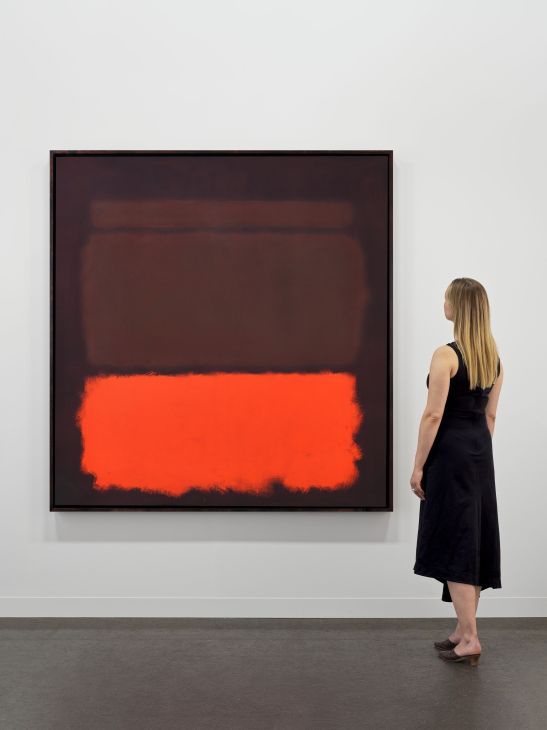
Edel Assanti
One of the new initiatives at this year’s fair is the Premiere sector, in which galleries present work created in the past five years. London-based gallery Edel Assanti has brought a colourful solo show by US artist Lonnie Holley. His paintings and unusual sculptures made from salvaged materials invite closer inspection. Head to the Unlimited sector for more Holley in the form of his 2019 film, I Snuck Off the Slave Ship. In it, Holley performs an improvised score, accompanied by a blend of real and re-enacted moments from his life. The combination of gorgeous music and moving visuals makes for a captivating, poignant work.
Messeplatz, Premiere, P3

‘Steve McQueen, Bass’, Laurenz Fondation Schaulager
The bustle and busyness of Art Basel in Basel makes for an energising but at times exhausting experience. Take a breather by hopping on the tram to Laurenz Fondation Schaulager for Steve McQueen’s Bass exhibition. The UK artist and filmmaker has taken over the cavernous space with an immersive light-and-sound experience. More than 1,000 LED tubes have been installed throughout Schaulager that slowly change colour over time. As they bathe the space in colourful hues, deep bass frequencies reverberate around it from subwoofers and speakers suspended in the air. The elements combine to create a mesmerising, calming experience.
‘Steve McQueen, Bass’ is open at Laurenz Fondation Schaulager until 16 November

Jahmek Contemporary Art
Sometimes the first thing that strikes you about a booth is the sign outside telling you where the gallery is based. So it will be for many visitors passing by Jahmek Contemporary Art, which hails from Angola’s capital, Luanda. Inside, heavy topics of conflict are brought to life in a haunting but beautiful exhibition. Zimbabwean artist Felix Shumba’s gentle soundscape and paintings of ethereal beings are not to be missed.
Messeplatz, Statements sector, M4
Julian Charrière, ‘Midnight Zone’, Museum Tinguely
At Museum Tinguely, French-Swiss artist Julian Charrière’s new exhibition Midnight Zone ponders the relationship between people and the earth – specifically as a world of water. Here, often in near-total darkness, visitors are invited to take a different perspective, whether that’s through lying down to watch films beamed onto the ceiling or by exploring parts of the ocean we’d never normally see. Many of the images of watery landscapes, both moving and still, are extraordinary and, on closer inspection, so too are the lengths to which Charrière has gone to capture them. Accompanied by a mesmeric soundscape, Midnight Zone is captivating, if at times unsettling. Dive in with an open mind.
Julian Charrière. ‘Midnight Zone’ is open at Museum Tinguely until 2 November

How do you spend your evenings when the city is baking, the air is still and it’s logistically impossible to head to the mountains or down to the coast? Do you find a shady terrace, crack open a chilled Super Bock and hope that the temperature dips below 25C before midnight? Do you crank up the AC, hydrate and stretch out on the sofa with the remote control in hand? Or do you opt for a more natural approach to cooling and open up your windows in the hope of a cool, fragrant cross breeze?
By the time I departed our Zürich office on Friday the temperature was 34C, the city was hopping with pedestrians and cyclists pouring into town, and even though public schools don’t break for another month it felt like the first official summer eve. Before leaving home I had lowered the awnings and closed most of the apartment windows, save for two left slightly ajar to allow for some airflow. On return the abode was remarkably cool (the building is a brutalist concrete affair from the late 1960s) and within a few minutes the stage had been set for a perfect Friday evening: a bottle of Oeil de Perdrix was opened and poured, curry cashews from Mercès in Barcelona in the bowl, NRJ Maroc was pumping out French beats from the radio and full prep for a barbecue was on the go in the kitchen. By the time dinner hit the table at 21.15, the mercury had dropped, a breeze had picked up and boats on the lake beyond were heading back to their docks. Over a chilled red from a lakeside vineyard we reviewed the past week (Ottawa, Toronto, Zürich, Abu Dhabi, Bahrain and Barcelona – all in six days) and the plan for the weeks ahead (Paris, Geneva, Copenhagen, Biarritz, Paris, London).
At 22.00, dishes were cleared, swim trunks pulled on and towels draped over shoulders. Our local bathing spot is a three-minute walk from the front door and given the warm evening I was expecting the lawn and stone walls to be filled with Zürchers knocking back rosé, chatting and canoodling. While I like the sense of community created by our little swimming set-up, I was happy to find the parkette quite empty – save for a couple who’d swum quite far out. Shirts off, we dove in, swam out and looked down the lake at Zürich twinkling in the distance. Perfection.
Back on the platform, the other pair of swimmers were drying off. We nodded and exchanged a few words of delight at the magic of such a simple pleasure. Our upcoming quality of life issue focuses on ten cities that each excel in a specific lane and though we might not have a winner in the swimmable category, it should be a focus of every city hall to ensure that citizens have access to a cool, clean body of water where people can take the edge off, clear heads and sleep well. If you don’t live in such a city, the Monocle apartment is available this July. Drop my colleague Izumi (id@monocle.com) a note if you’d like to book.
Lisbon
It’s Saturday midday and our Emirates 777 is making an approach from the south to Lisbon’s Humberto Delgado Airport. It’s a stunning clear day and there is no holding or zigzags; we touch down a few minutes early. As we taxi in I can see that all the long-haul gates are occupied, so we wait until an Azul A330 pushes back and we finally make the turn and line up. I am all set to speed through the airport and see whether I can be in a cab in under five minutes. But after a minute of striding down the concourse I hit a humid, agitated human wall of passengers jostling to figure out what the holdup is, if there are designated lanes and if anyone is in charge. As is so often the case, a group of young staffers in polo shirts and lanyards have been tasked with answering questions and enduring rants. The problem is that the newly installed electronic gates are not working and there are not enough police officers to check passports in a speedy manner. In short, utter chaos.
With two to three e-gates semi-functioning and as many border cops in their booths, I opt for the human solution. Five times as many people sided with technology. I compare my progress with a tall American man who was on my flight and went for the electronic option. I have about 80 people in front of me but after 20 minutes I step up to the booth and I’m on my way. The electronic line has hardly moved an inch. Brand Portugal needs to sort this out as the summer season swings into high gear. First impressions are lasting ones. Bureaucrats need to be disciplined and people need to be deployed to solve the problem.
Lisbon II
Design and art week wrapped up in Lisbon this past Sunday and it was a record year for new exhibitors and visitors. Sandwiched between Milan’s Salone del Mobile and Copenhagen’s 3 Days of Design fair, Lisbon has the opportunity to go even further – hosting not only domestic talent but also more makers from Brazil, Morocco, Angola and even neighbouring Spain.
Lisbon to Toronto on TAP
Next time you fly with Portugal’s flag carrier, TAP, pay special attention to the male flight attendants – they’re a breed unlike any other in civil aviation. Rugged yet well-groomed, bearded and all sporting that Portuguese mane that has been the national male hairstyle for centuries (think football manager meets sailor on one of Vasco da Gama’s vessels), it’s a fitting look that handsomely carries the national brand to points across the globe.
Ottawa
On Thursday evening branches of the Meere, Vuht and Brûle families gathered at the Estonian Embassy to remember my grandmother, Ilse Erika Meere, or simply Ema to all of us. The ambassador said a few poignant words, my cousin Kristi and uncle Viljar told stories about our family’s arrival in Canada after the war and over dinner scores of photos (from the 1920s to 2024) were passed around. Aside from raising a family, working as a lab technician and helping establish the Estonian community in Canada, Ema spent much of her 106 years staying chic and sharp. The photos of outfits and poses deserve an exhibition. Thursday would have been her 107th birthday. Ema would have approved of the setting, the canapés and the family in attendance – but would’ve been disappointed by the lack of dancing and high kicks. Next time Ema. Promise.
As more than 1.5 million pilgrims descend on Mecca for this year’s Hajj, Saudi Arabia is leaning heavily on technology to manage the world’s largest annual religious gathering. Overhead drones equipped with AI technology monitor crowds, assess potential risks and even deliver medicine. Underfoot, the marble floors of the Great Mosque are kept between a cool 22 to 24C by the largest air-conditioning system on the planet. Thousands of misting fans, shaded walkways and water stations are in position – all part of a vast logistical effort to protect pilgrims from the heat that claimed 1,300 lives during last year’s holy ritual.
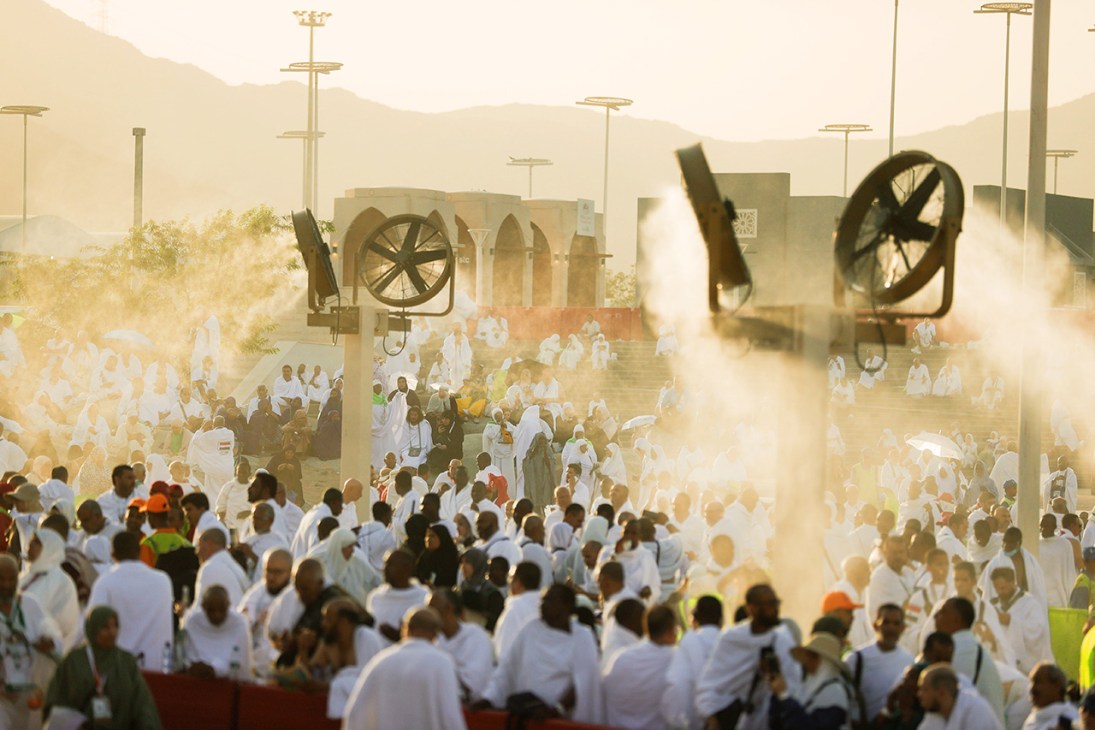
On the surface these measures are sensible, even necessary. With climate change intensifying and the Hajj continuing to attract growing numbers, ensuring safety is no small feat. Saudi Arabia has also turned away more than 270,000 unregistered pilgrims to prevent overcrowding, a contentious but arguably vital move.
This year sees the debut of the Falcon drone, developed by the General Directorate of Civil Defence. This isn’t just any surveillance tool – it’s a firefighting and rescue-ready machine that can fly for up to 12 hours, carry a 40kg payload, and beam thermal and live footage back to command centres. It’s designed for complex environments, from high-rises and dense crowds to industrial zones and hazardous sites, making it a handy addition to the world’s biggest crowd-control exercise.

But as someone who has lived in and covered the Middle East, as well as having taken the religious trip to Mecca myself, I can’t help but reflect on the change of atmosphere this creates. The spiritual essence of Hajj – its rituals of humility, stillness and submission – is now conducted against the backdrop of humming machinery and the mechanical whirr of surveillance drones. For many, this might feel like a dystopian layer superimposed on one of the world’s most sacred traditions. There’s something deeply moving about the sight of millions dressed in black and white, united in purpose. But how does that moment feel when it’s accompanied by the low buzz of a UAV or the artificial cool of an enormous HVAC system?
That said, it’s important to recognise that this is Saudi Arabia’s attempt to future-proof an event that is both ancient and increasingly hard to manage. It’s also a glimpse into a new national identity – one that fuses religious heritage with technical prowess. Mecca and Medina host most of the kingdom’s hotel rooms, both existing and under construction, reflecting the importance of religious tourism in the broader Vision 2030 agenda.
In fact, there might be a lesson here for other nations too. Whether managing religious festivals, cultural events or urban crowds, the blend of old and new is becoming a universal challenge. How do we preserve tradition while adapting to a warming world and growing populations? It’s a delicate balance. Faith can flourish in the future but perhaps it’s worth investing some of that wealth into quieter tech.
They make beautiful landscapes, places where office workers devouring their lunchtime sandwiches can be surrounded by buzzing bees and chirping birds. But there’s a lot more than that behind the making of any project by Los Angeles and San Francisco-based Terremoto. This company is underpinned by a considered, radical manifesto that’s out to challenge how landscape architecture works – and even what its remit should be.
Just take this from what reads like a declaration of independence from the rest of their trade (as posted on their website): “We gnaw on the bones of modern and postmodern landscapes alike and consider new, inverted futures for the baroque and the picturesque. We pillage the tattered fuselage of worlds East and West. We have no particular identifiable style, because beauty is diverse, and because ‘having a particular style’ sounds very boring.” I don’t think they are planning to visit the Chelsea Flower Show.
One of the team’s recent projects is Denver 17th Street Corner Plaza, a privately owned but publicly accessible space. Here, surrounded by skyscrapers, they have made a curvy garden with large trees, giant boulders, chunky wood benches and grasses that move with the breeze. A slice of rewilding in the downtown.

David Godshall, a principal at Terremoto, is one of its creators and while content with the outcome he also underlines why there won’t be too many more schemes such as this in the portfolio. Because that’s the first thing that’s wrong with landscape architecture: its practitioners unwisely stray too far. “We believe that landscape architects and landscape designers should mostly be local. I say that because landscape making is inescapably regional. And if you were to take me and put me somewhere else in Europe, for example, I probably wouldn’t be very good at my job. We believe that landscapes should be by, of and for, the creatures and communities that they serve.”
The Denver project came in through a side door – the client was someone that they had worked with before, from closer to home. To safeguard both the site and their beliefs, they trod with care, questioning every move. They started by focusing on the sourcing of local materials because, as Godshall says, “It seems like good logic to us that, in order to keep the carbon footprint of our projects light, the materials should come from nearby. We mostly move stuff around in the US on the backs of big trucks, and the fewer trucks driving around, the lighter the carbon footprint of the project. Interestingly, taking this approach also inescapably imbues a project with a sense of regionalism.” And there’s another added consequence – this helps support local businesses, including plant growers, quarries and timber mills.
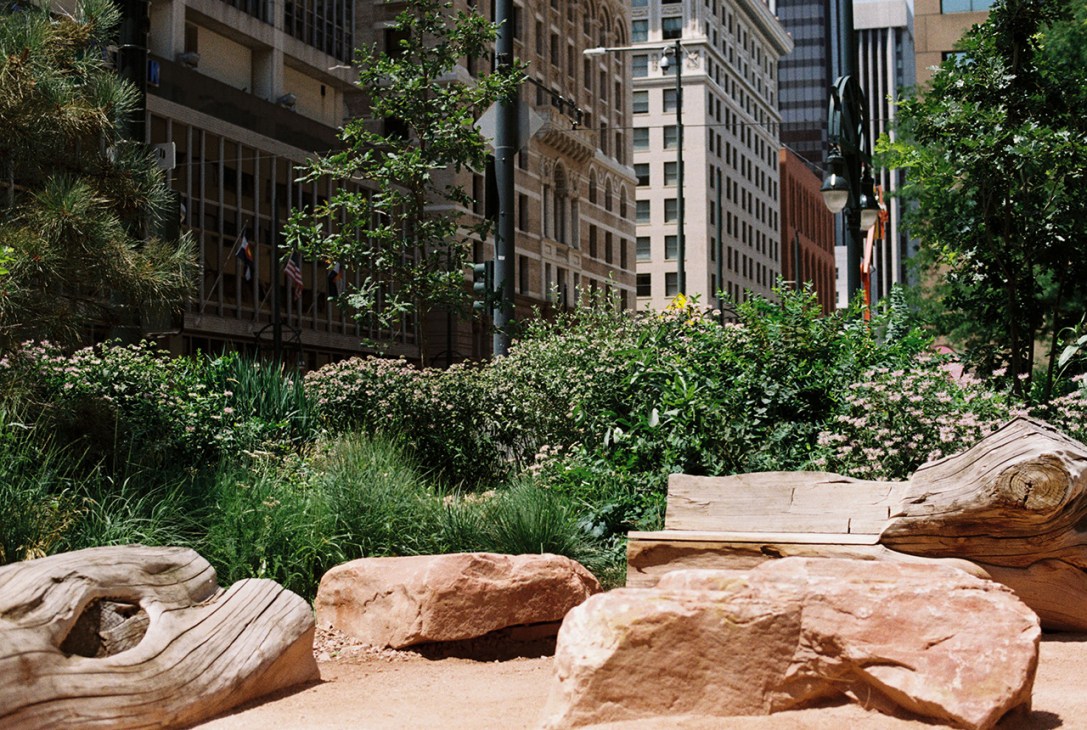

Godshall is at pains to ensure that everyone involved in the making of the Denver project is given credit. And, I mean, everyone. One of Terremoto’s other manifesto-like pledges is to shine the light on the people who actually build their landscapes – the labourers who haul the giant rocks into position, lug bags of soil around. He explains: “The making invisible of the contribution of the labourer – that’s mostly done in the mainstream perspective – is either passive, systemic racism or classism. Hiding the contributions of the mostly Latino or Latinx men who build the landscapes that we make in California seems to be quietly problematic to us.”
Godshall is eloquent, measured (and, yes, I am sure that all his colleagues are too) and Terremoto – “earthquake” in Spanish – clearly has both the ambition and potential to shake up the world of landscape design. But luckily, its work is more than just polemic, it’s also about beautiful, wild, nature-embracing landscapes that people respond to. These are not crappy community gardens made from abandoned pallets.
I ask Godshall if he’s happy with the outcome, how people are using the benches and locating spots to linger (before answering, he stresses Terremoto’s opposition to trying to control what people do in a landscape – an American problem, he believes). “We have learned that the needs of an office worker are not that wildly different from the needs of say, a honeybee or a butterfly or a bird, in that what we mostly want is to be able to be outside, to enjoy the environment, have a sip of water and commune with nature,” he says. In short, if you want to savour your burger in the sun without a side order of manifesto – he’ll leave you alone.
To hear Monocle’s full interview with Terremoto’s David Godshall, listen to ‘The Urbanist’ , below:



